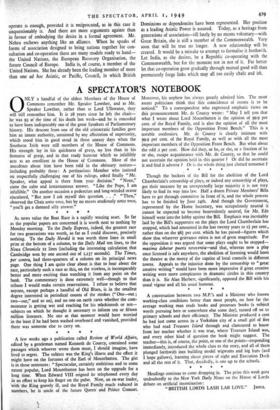A few weeks ago a publication called Review of World
Affairs, edited by a gentleman named Kenneth de Courcy, contained some passages which whoever wrote them must, I should imagine, have lived to regret. The subject was the King's illness and the effect it might have on the fortunes of the Earl of Mountbatten. The gist is in these sentences: " Spectacular, certainly ambitious and to some extent popular, Lord Mountbatten has been on the upgrade for a long time. When Edward VIII reigned he telephoned every day in an effort to keep his finger on the pulse. Now, an ex-war leader, with the King gravely ill, and the Royal Family much reduced in numbers, he is uncle of the future Queen and Prince Consort.
Moreover, his nephew has always greatly admired him. The most astute politicians think that this coincidence of events is to be noticed." To a correspondent who expressed emphatic views on this pronouncement Mr. de Courcy wrote : " May I tell you that what I wrote about Lord Mountbatten is the opinion of 99.9 per cent. of the Royal Family, and is also the opinion of all the most important members of the Opposition Front Bench." This is a notable confession. Mr. de Courcy is clearly intimate with 99.9 per cent. of the Royal Family, as well as with all the most important members of the Opposition Front Bench. But what about the odd .1 per cent. How did they, or he, or she, or a fraction of he or she, escape acquaintance with Mr. de Courcy, so that he could not ascertain the opinion held in this quarter ? Or did he ascertain it and find it adverse ? Or is the whole thing just clotted nonsense ?






































 Previous page
Previous page